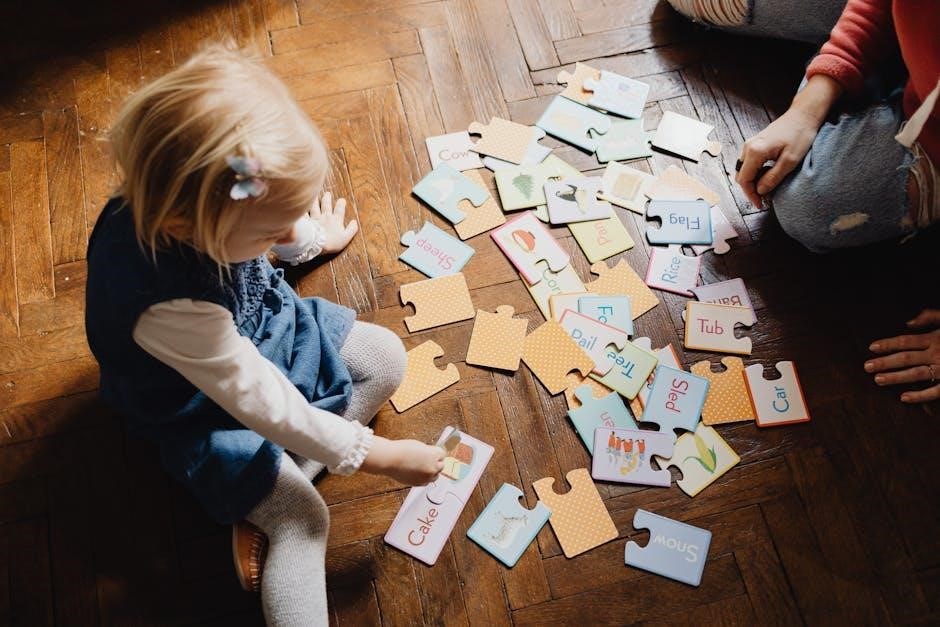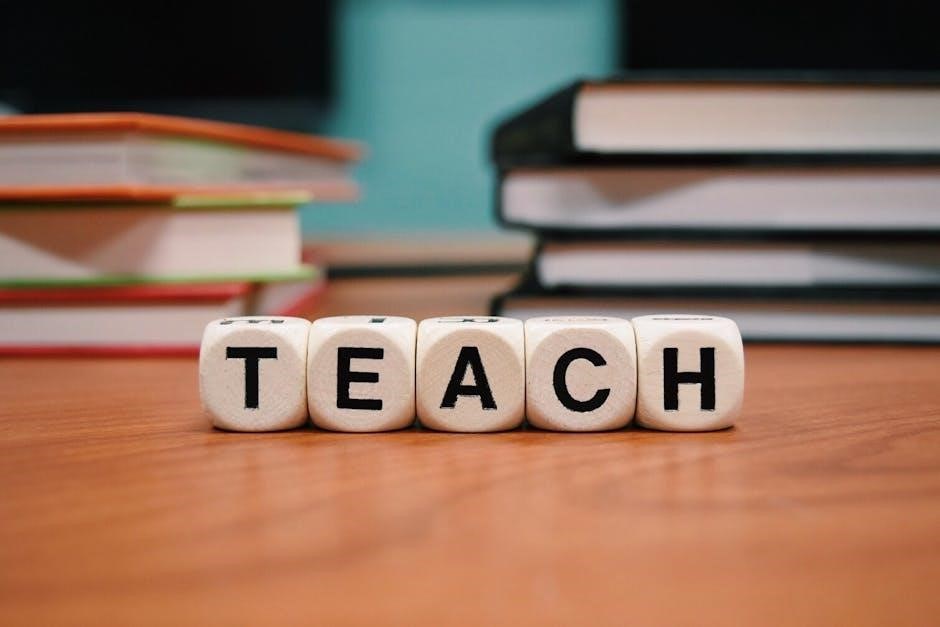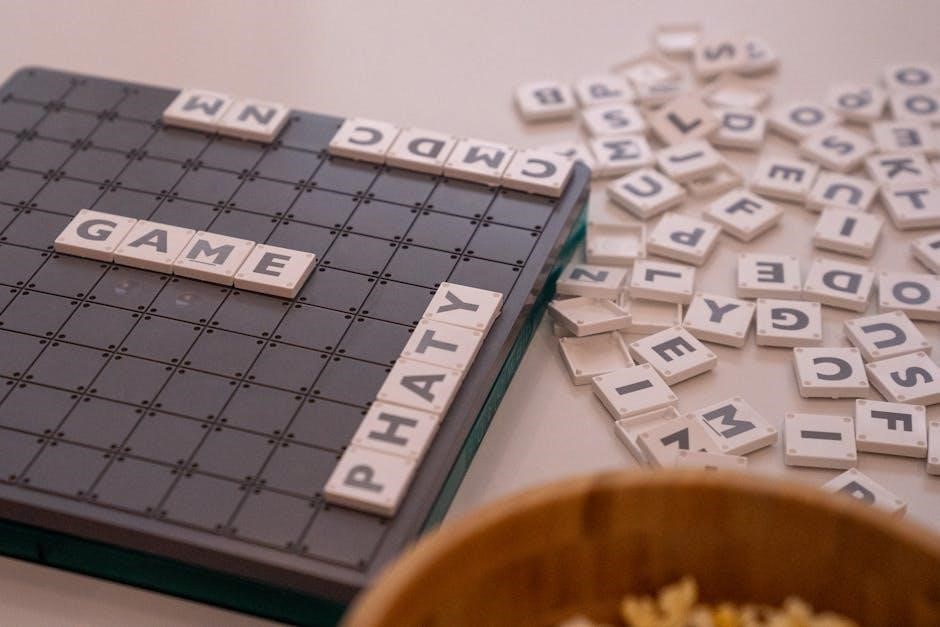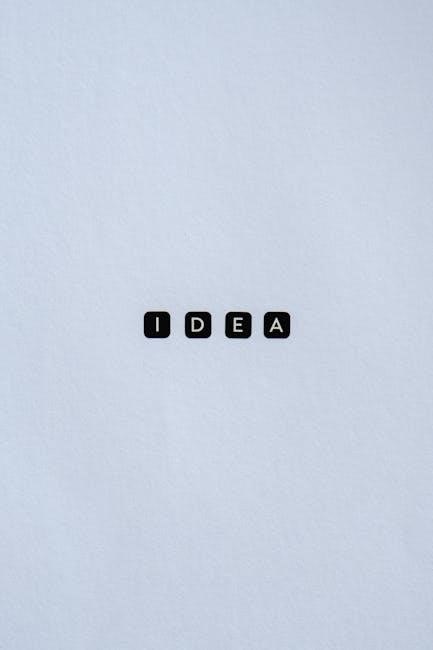
Kindergarten spelling words are foundational for early literacy, focusing on high-frequency sight words from Dolch and Fry lists. These words, like “I,” “a,” and “the,” build reading and writing skills, preparing young learners for future academic success. Resources such as PDF worksheets and interactive tools make learning engaging and accessible for kindergartners.
Importance of Sight Words
Sight words are essential for early literacy as they represent high-frequency words that appear often in texts. Recognizing these words by sight improves reading fluency and comprehension. They form the foundation of spelling and writing skills, enabling kindergartners to focus on more complex aspects of literacy. Mastering sight words builds confidence and encourages independent reading, making them a cornerstone of kindergarten education.
Benefits for Reading and Writing
Mastering kindergarten spelling words enhances reading fluency and accuracy, allowing children to decode texts effortlessly. It also strengthens writing skills by providing a vocabulary foundation, making expression more precise. These benefits boost overall literacy, fostering a love for reading and writing that supports lifelong learning and academic success.
High-Frequency Words in Kindergarten
Kindergarten high-frequency words, like “the,” “is,” and “and,” are common in texts, aiding reading fluency. These foundational words, from Dolch and Fry lists, help build literacy skills and are essential for early learners to recognize and spell confidently, supporting overall reading and writing development.
Dolch Sight Words
Dolch Sight Words are a curated list of high-frequency words essential for early literacy. They include common words like “the,” “and,” and “is,” which appear frequently in texts. These words are designed to be recognized by sight, bypassing phonetic decoding, and are crucial for building reading fluency. The Dolch list is divided into grade levels, with for Pre-K and 50 for Kindergarten, making them a valuable resource for teachers and parents. PDF worksheets and activities often incorporate these words to engage young learners and reinforce their recognition and spelling abilities effectively.
Fry Sight Words
Fry Sight Words are another essential list of high-frequency words that support early reading development. They are organized by grade levels, with specifically tailored for kindergarten. These words, such as “a,” “is,” and “for,” are designed to be recognized instantly, enhancing reading fluency. Fry Sight Words are often included in educational resources, including PDF worksheets, to provide engaging and effective spelling practice for young learners, aligning with curriculum goals.
Teaching Strategies
Effective kindergarten spelling instruction involves phonics, sight word recognition, and hands-on activities. Daily practice with spelling dictation and interactive games enhances engagement and skill development in young learners.
Phonics Instruction
Phonics instruction is a cornerstone of teaching kindergarten spelling words, focusing on connecting sounds to letters. It involves systematic lessons on blending, segmenting, and manipulating sounds to decode words. This approach enhances reading and spelling abilities, allowing children to recognize patterns and build a strong foundation for literacy. Regular practice and engaging activities make phonics instruction both effective and enjoyable for young learners.
Writing Workshops
Writing workshops in kindergarten focus on applying spelling skills in meaningful contexts. These sessions provide structured time for children to practice writing, reinforcing phonics and sight word knowledge. Activities include tracing, word building, and short sentence writing, fostering creativity and confidence. Workshops often use PDF worksheets and hands-on materials to engage young learners, making the process interactive and enjoyable while building foundational literacy skills.
Resources for Spelling Words
Kindergarten spelling words PDFs offer a variety of worksheets and activities tailored for young learners. These resources include high-frequency word lists, tracing exercises, and interactive games, making learning engaging and accessible. They provide structured practice for mastering sight words and phonics, supporting both teachers and parents in fostering early literacy skills effectively.
PDF Worksheets
Kindergarten spelling words PDF worksheets provide structured activities for young learners, including tracing, matching, and fill-in-the-blank exercises. These downloadable resources focus on sight words and phonics, offering a practical way to practice spelling at home or in the classroom. Many PDFs are organized by skill level, making it easy to track progress and reinforce learning in a fun, engaging manner.
Online Tools and Apps
Online tools and educational apps offer interactive ways for kindergartners to practice spelling words. Games, quizzes, and virtual flashcards make learning engaging and fun. Apps like ABCmouse and Khan Academy provide personalized learning experiences, while websites offer printable PDFs and digital exercises. These resources support both classroom instruction and home practice, helping children build confidence in their spelling abilities through technology.
Activities and Games
Engaging activities like spelling bingo and scavenger hunts make learning fun. Interactive games and hands-on exercises help kindergartners practice high-frequency words and sight words effectively.
Interactive Learning
Interactive learning enhances engagement with kindergarten spelling words through digital tools and hands-on activities. Educational apps and games, like spelling bingo, make practice enjoyable. Tools such as Google Translate assist with PDF resources, while writing workshops encourage creative application of sight words, fostering both spelling and reading skills in a dynamic environment.
Spelling Games
Spelling games are an engaging way to introduce kindergartners to foundational literacy skills. Activities such as spelling bingo and word matching encourage interaction and enjoyment while learning. These games help children recognize high-frequency sight words and improve phonics abilities. Utilizing PDF worksheets and online tools, teachers can create structured activities that enhance retention and build confidence in young learners, making spelling practice both fun and effective.

Parental Involvement
Parents play a vital role in supporting their child’s spelling journey at home. Using kindergarten spelling words PDFs, they can practice sight words and engage in interactive activities, fostering early literacy skills and confidence in young learners.
Supporting at Home
Parents can significantly enhance their child’s spelling skills by practicing with kindergarten spelling words PDFs. Daily review of sight words, spelling dictation, and interactive games foster early literacy. Using resources like Dolch and Fry word lists, families can create engaging activities that reinforce classroom learning. Regular communication with teachers ensures alignment with curriculum goals, promoting consistent progress and confidence in young learners.
Communication with Teachers
Regular communication between parents and teachers is crucial for supporting kindergarten spelling development. teachers often provide PDF resources like Dolch and Fry word lists to ensure consistency at home. Parents can discuss their child’s progress, identify areas needing extra support, and align home activities with classroom goals. This collaboration fosters a cohesive learning environment, enhancing the child’s ability to master spelling words effectively and confidently.

Assessment and Progress Tracking
Teachers use spelling tests, worksheets, and oral assessments to track kindergarten progress. PDF resources like Dolch word lists help monitor mastery, ensuring timely interventions and celebrating growth.
Methods for Evaluating
Teachers evaluate kindergarten spelling progress through regular spelling tests, oral assessments, and worksheets. PDF resources like Dolch word lists help track mastery. Observing writing workshops and comparing initial and final assessments reveals growth. Identifying challenges early allows tailored interventions, ensuring each child meets learning goals effectively. Continuous monitoring guides instruction and celebrates progress.
Tools for Monitoring
Teachers use PDF worksheets, progress tracking sheets, and online apps to monitor spelling skills. Dolch word lists provide a structured approach, while digital tools offer interactive assessments. Regular quizzes and writing samples help evaluate mastery. Progress tracking sheets allow teachers to identify areas needing review and celebrate student improvements over time, ensuring personalized support for each learner.

Overcoming Challenges
Dysgraphia and learning disabilities can hinder spelling progress. Strategies like multisensory approaches, assistive technology, and personalized learning plans help students overcome these challenges. PDF resources and tailored support ensure inclusive learning experiences.
Dysgraphia
Dysgraphia is a learning disability affecting writing and spelling abilities. Children with dysgraphia may struggle with letter formation, spelling, and written expression. Early identification is crucial for providing tailored support. Multisensory approaches, such as using tactile activities and assistive technology, can help improve spelling skills. Parents and teachers can use PDF resources to create personalized learning plans, ensuring inclusive education for kindergartners with dysgraphia.
Learning Disabilities
Learning disabilities, such as dyslexia, can impact a child’s ability to spell and recognize words. Kindergarten spelling words PDFs offer structured activities to support these learners. Multisensory techniques, like sight word drills and phonics exercises, help children with learning disabilities grasp spelling concepts. Teachers can use these resources to create personalized learning plans, ensuring inclusive and effective instruction for all students, regardless of their challenges.

Technology Integration
Educational apps and tools like Google Translate enhance learning by converting PDF spelling worksheets into multiple languages, making resources accessible and engaging for diverse kindergarten learners worldwide.
Educational Apps
Educational apps offer interactive spelling games and exercises, making learning fun for kindergartners. Many apps use PDF worksheets to create engaging activities, such as tracing letters or matching words. They also provide progress tracking, allowing parents and teachers to monitor development. These tools are designed to support phonics instruction and sight word recognition, ensuring a strong foundation in early literacy skills for young learners.
Google Translate for PDFs
Google Translate is a versatile tool for translating PDFs, including kindergarten spelling word lists. It supports over 100 languages, making it ideal for multilingual classrooms. Teachers can use it to create translated resources, ensuring all students understand spelling words. This feature bridges language barriers, fostering inclusivity and helping non-English speakers grasp foundational literacy skills effectively.

Readiness and Transition
Kindergarten readiness involves foundational skills like alphabet knowledge and sight word recognition. PDF resources help prepare children, ensuring a smooth transition to formal learning environments.
Preparing for Kindergarten
Preparation for kindergarten involves introducing basic literacy skills, such as recognizing alphabet letters and simple sight words. Parents can use kindergarten spelling words PDFs to practice high-frequency words at home. These resources often include interactive activities and worksheets designed to make learning engaging. Early exposure to spelling and reading concepts helps build confidence and lays a strong foundation for future academic success.
Moving to First Grade
Moving to first grade requires a strong foundation in spelling and reading; Kindergarten spelling words PDFs help bridge the gap by reinforcing high-frequency words and basic literacy skills. These resources ensure students enter first grade with confidence, ready to tackle more complex reading and writing tasks. Consistent practice with these tools aids in smoother academic transitions and long-term success.

Classroom Implementation
Classroom implementation involves structured lessons with sight words from Dolch and Fry lists. Interactive activities and hands-on practice with PDF worksheets engage young learners effectively, fostering literacy growth.
Structured Lessons
Structured lessons in kindergarten focus on daily spelling routines, incorporating sight words from Dolch and Fry lists. Explicit instruction and hands-on activities, such as tracing and matching games, reinforce learning. PDF worksheets provide guided practice, while interactive tools enhance engagement. Teachers use phonics-based approaches to connect spelling with reading, ensuring a strong foundation for early literacy skills and fostering confidence in young learners.
Flexible Adaptations
Flexible adaptations in kindergarten spelling instruction cater to diverse learning needs, ensuring all students can thrive. Teachers incorporate multisensory approaches, such as tactile activities for kinesthetic learners, while digital tools like interactive PDFs engage visual learners. For students with challenges like dysgraphia, adaptive strategies include larger fonts and voice-to-text features, fostering inclusivity and progress in spelling development.
Kindergarten spelling words lay the groundwork for literacy, with high-frequency sight words and PDF resources supporting interactive and accessible learning for young students. These tools provide a strong foundation, fostering a love for reading and writing that extends beyond the kindergarten year.
Kindergarten spelling words, including high-frequency sight words from Dolch and Fry lists, are essential for early literacy. PDF resources offer structured activities and practice, helping students recognize and spell common words like “the” and “is.” These tools support phonics instruction, writing workshops, and interactive learning, ensuring a strong foundation for reading and writing skills. Consistent practice with these materials fosters confidence and fluency in young learners.
Future Learning Opportunities
Mastering kindergarten spelling words creates a strong foundation for future literacy skills. As students progress, they will encounter more complex texts and expand their vocabulary. These early skills prepare learners for advanced reading and writing tasks, fostering confidence and academic readiness. Building on sight words and phonics, students will be well-equipped to tackle higher-grade challenges and achieve long-term educational success.